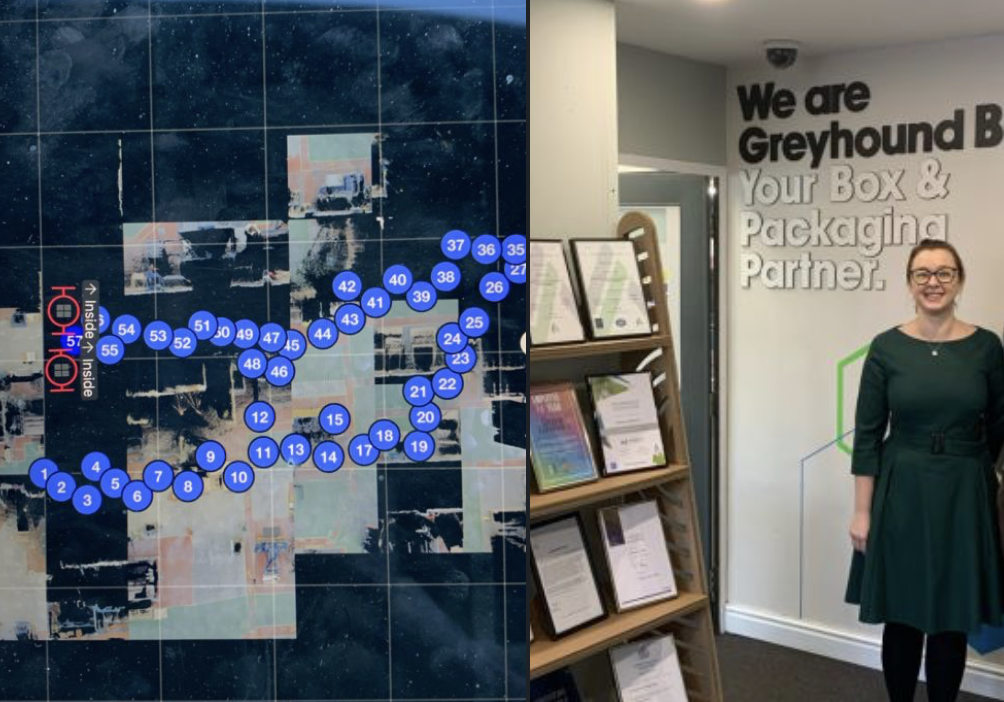The Made in Group is creating 'digital twins' of members factories, for use in the Backing Britain Hybrid Expo. The digital twins will also enable manufacturing companies to remove geographic boundaries and explain how their factory works with spatial awareness.
Digital twins are essential to any smart factory, compliment existing industry 4 strategies and can be updated as the business invests and updates its facility.
More than 100 of members are participating in the project which involves having their premises scanned with matterport 3D cameras. The goal is to create the UK's most extensive collection of virtual factory tours.

Greyhound Box pictured above were one of the first members to have their premises scanned
Members who have already participated in the project include:
Made in Yorkshire member Pam Jackson from Siddall & Hilton, who said;
"The 3D scanning has provided us with the opportunity to capture imagery of our new production line.
Our recent £2m investment in the new welded mesh machine is the first significant step in our world-class 'intelligent' factory journey."
Dave Chappell, Sales Director of Crompton Controls, said;."The digital twin enables me to Showcase my full company, build confidence into any potential or existing customer; they can easily navigate around our full facilities from the comfort of their desk.“The 3D Mapping also allows any future apprentices to visit our factory virtually to gain a feel for the manufacture, design and production environments.“An absolute must for any company wanting to attract the next generation of Engineers.”
Despite the new opportunities the digital era represents there are challenges also, slow digital adoption, disengagement in the boardroom, and lack of skills in the digital realm.
Jason Pitt said, The gap between digital competencies in tier 2 and other sectors is not as small as you may think, when we have deliberated this topic at our industry 4 advisory boards I have often considered why this may be. One theory is that the barriers to entry required to start a manufacturing company are formidable; in my opinion this creates lower levels of competition which in turn means the pressure for adoption of digital technologies can appear less urgent.
“We need to widen our vision and see the dramatically changing landscape in manufacturing facilities across Europe and Asia, we need to embrace industry 4 to improve competitiveness.
"Manufacturing is a global sector, and for the UK to keep its reputation as one of the leading engineering nations, we must be more inclusive of digital transformation.
"Our most prominent companies, such as Rolls Royce and BAE Systems already have well-developed capabilities on this front; they are all digitally fluent and have widespread use of industry4, which is accelerating year after year.
"As a membership group representing privately owned SMEs mainly in the tier 2 category, we must give companies a nudge and encourage a faster pace regarding industry 4.
"The supply chain needs to be aware that supply chains in other nations are investing faster than the UK; coupled with the decreasing age of buyers at the most prominent companies and global sourcing, there is a threat to the industry in the lower tiers.
We see the fantastic applications of industry4 from companies such as Boston robotics or the automation in Ocado and look in wonder; when what we need to be asking is how we can adopt new technologies in our businesses. How do we become more aligned with the larger companies? We need to understand what they understand."
The motivations for being an ‘innovation active’ company are clear, an ageing workforce, indeed an ageing population, shortage of skills and dated machinery; there is a point in time where the companies that have not invested will be too far behind to bridge the gap. The opportunities as we emerge could give Britain a chance to renew its engineering heritage. Hence, claim its rightful place at the forefront of this new industrial revolution, or we can get left behind.
The push towards greener manufacturing will lead manufacturers invariably to a more digitised and hybrid factory. The smart factory, just as with other issues such as climate change, has its time and whilst industry 4 adoption was slow at the start this will be the future of manufacturing.
There is a natural and tangible benefit to improving the digital fluency of the workforce; realising this can help Britain become a leader for future generations.
Jason added; "In pursuing our belief that UK industry needs to make strides in this area we are perfecting our hybrid model for membership associations. We believe we can become the UK’s leading membership group who understands technology better than anyone else but unlike old social media platforms we really are social. Monthly drinks events and a hybrid exhibition that includes celebrity and industry speakers proves there is a way for the traditional and digital to co-exist."
To register for the Backing Britain hybrid exhibition as a visitor or if you are interested in exhibiting, please visit https://g2made.uk/bb3expo for more details.

